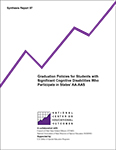 Graduation rates and requirements for earning a regular diploma are topics of increasing interest as states focus on ensuring that their students are college and career ready when they leave school with a diploma. Considerable attention has been given to those students with disabilities who participate in states’ general assessments. Recently, attention has turned to students with significant cognitive disabilities who participate in states’ alternate assessments based on alternate achievement standards (AA-AAS).
Graduation rates and requirements for earning a regular diploma are topics of increasing interest as states focus on ensuring that their students are college and career ready when they leave school with a diploma. Considerable attention has been given to those students with disabilities who participate in states’ general assessments. Recently, attention has turned to students with significant cognitive disabilities who participate in states’ alternate assessments based on alternate achievement standards (AA-AAS).
NCEO recently published a new report on this topic, Graduation policies for Students with Significant Cognitive Disabilities Who Participate in States’ AA-AAS. There is wide variation across states in their graduation policies for this population.
Key findings included:
- Nearly 70% of states’ policies indicated that students with the most significant cognitive disabilities who participate in the AA-AAS can receive a regular diploma.
- In states with policies that indicated that students with the most significant cognitive disabilities who participate in the AA-AAS could not receive a regular diploma, all but one state indicated that other end-of-school documents (e.g., certificates, special diplomas) were available to these students.
- Both states that allowed students with the most significant cognitive disabilities who participate in the AA-AAS to receive a regular diploma and states that did not generally had one or more end-of school documents (other than the regular diploma).
The report (PDF) is available at: http://www.cehd.umn.edu/NCEO/OnlinePubs/Synthesis97/SynthesisReport97.pdf
